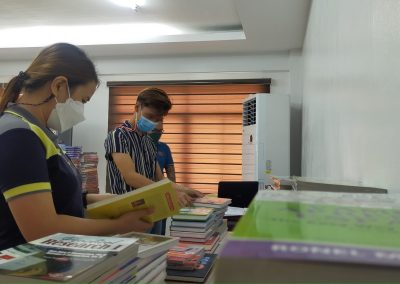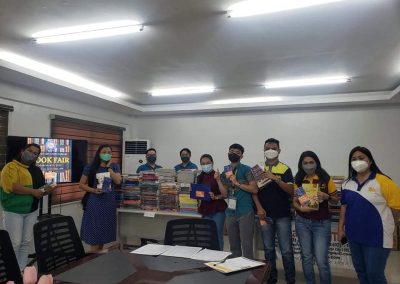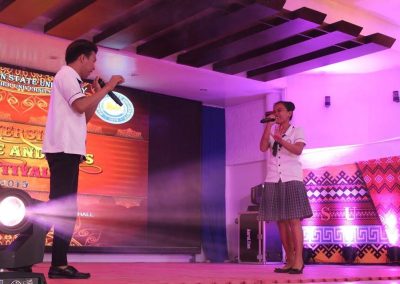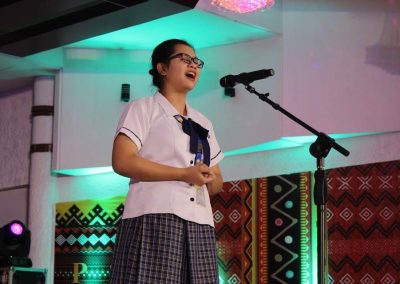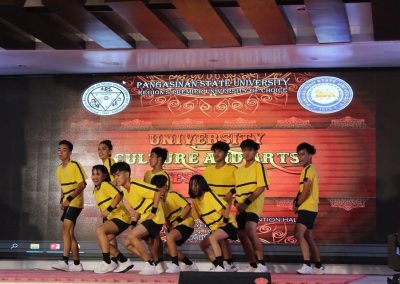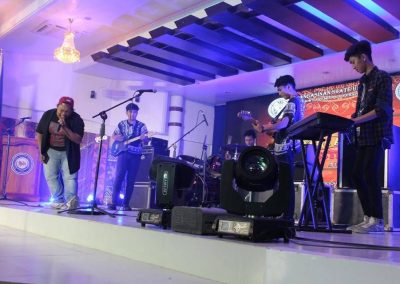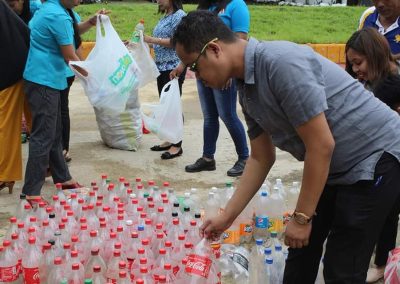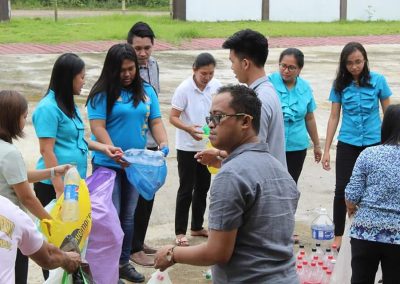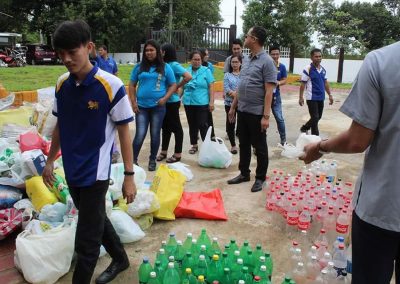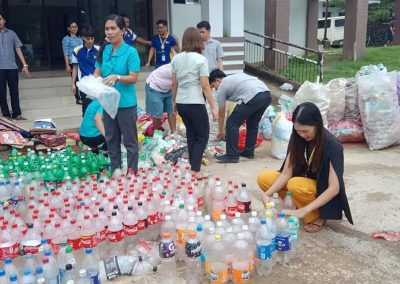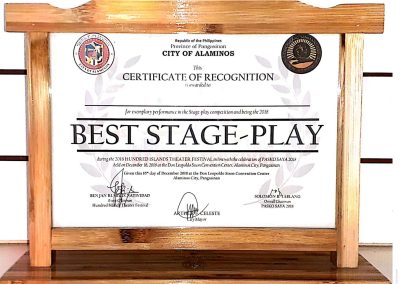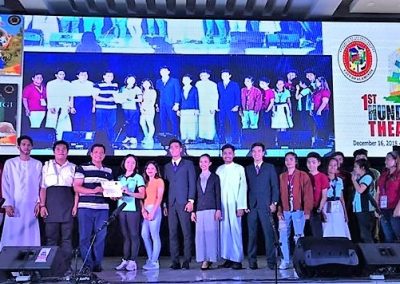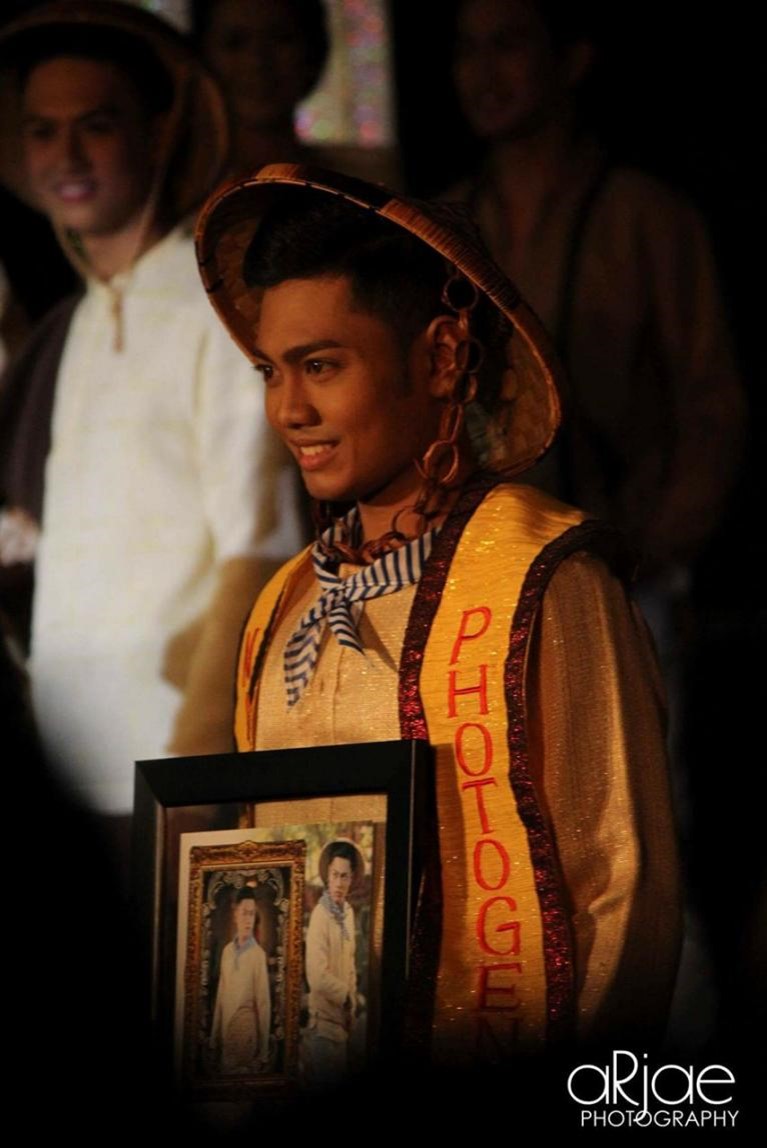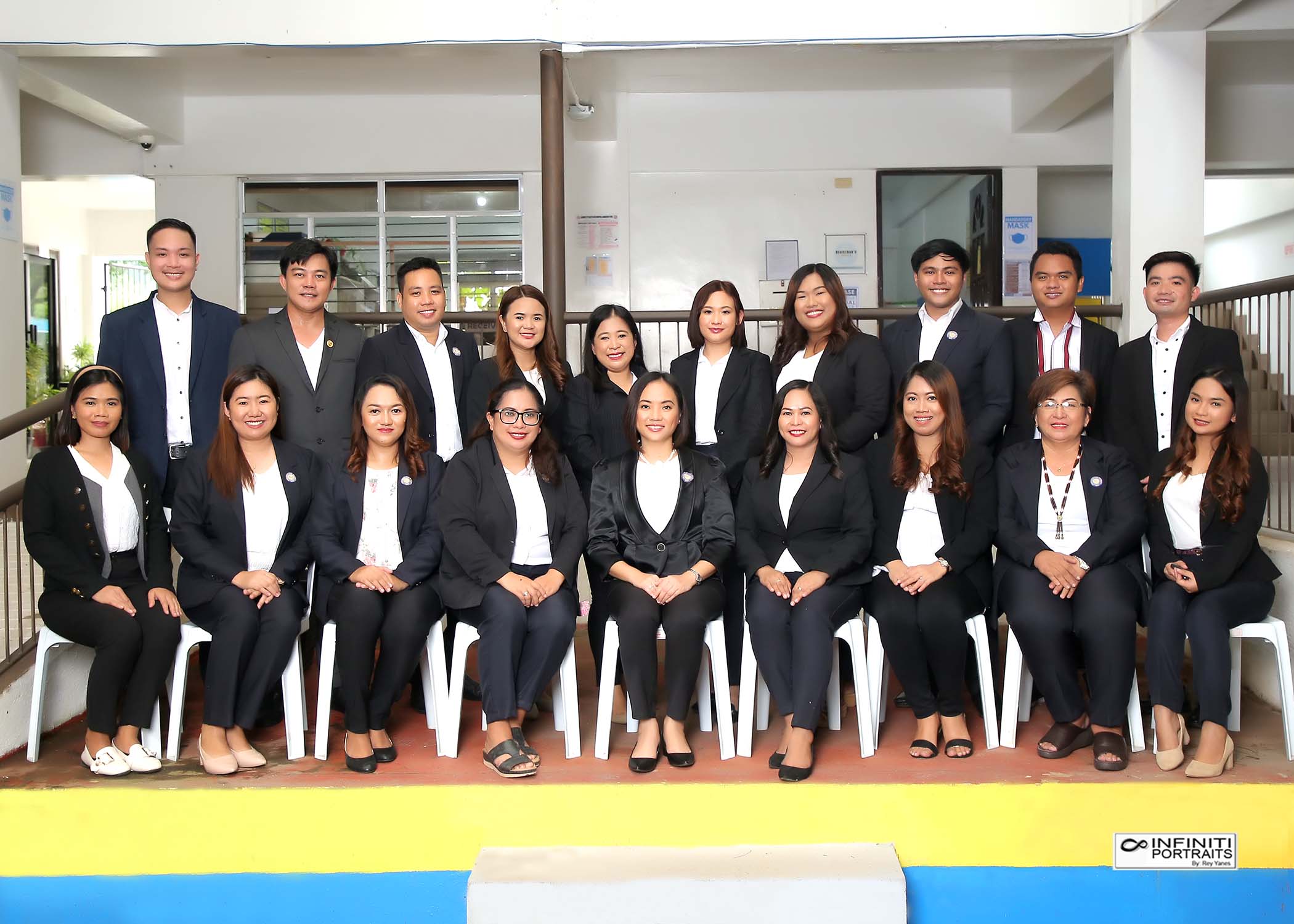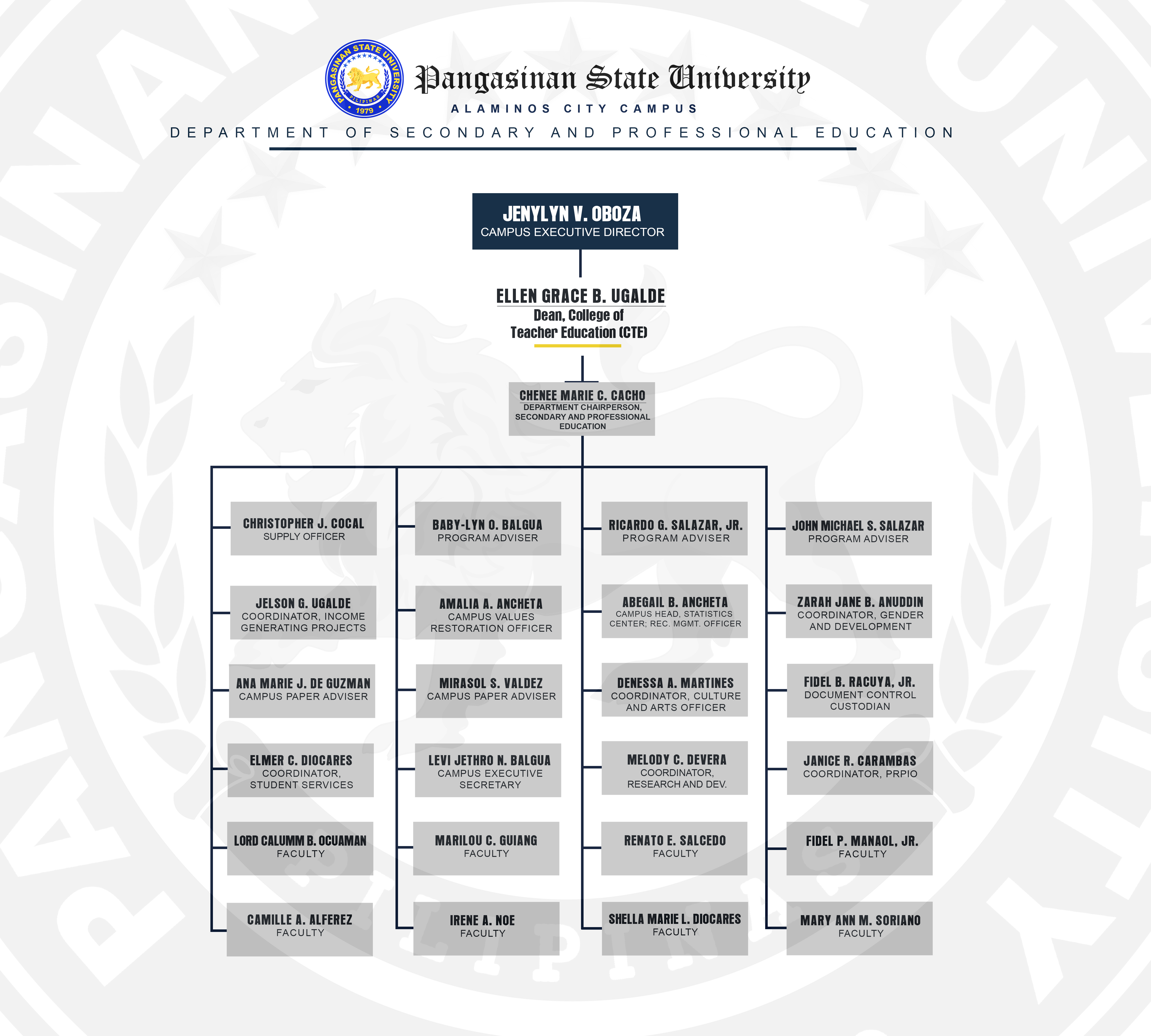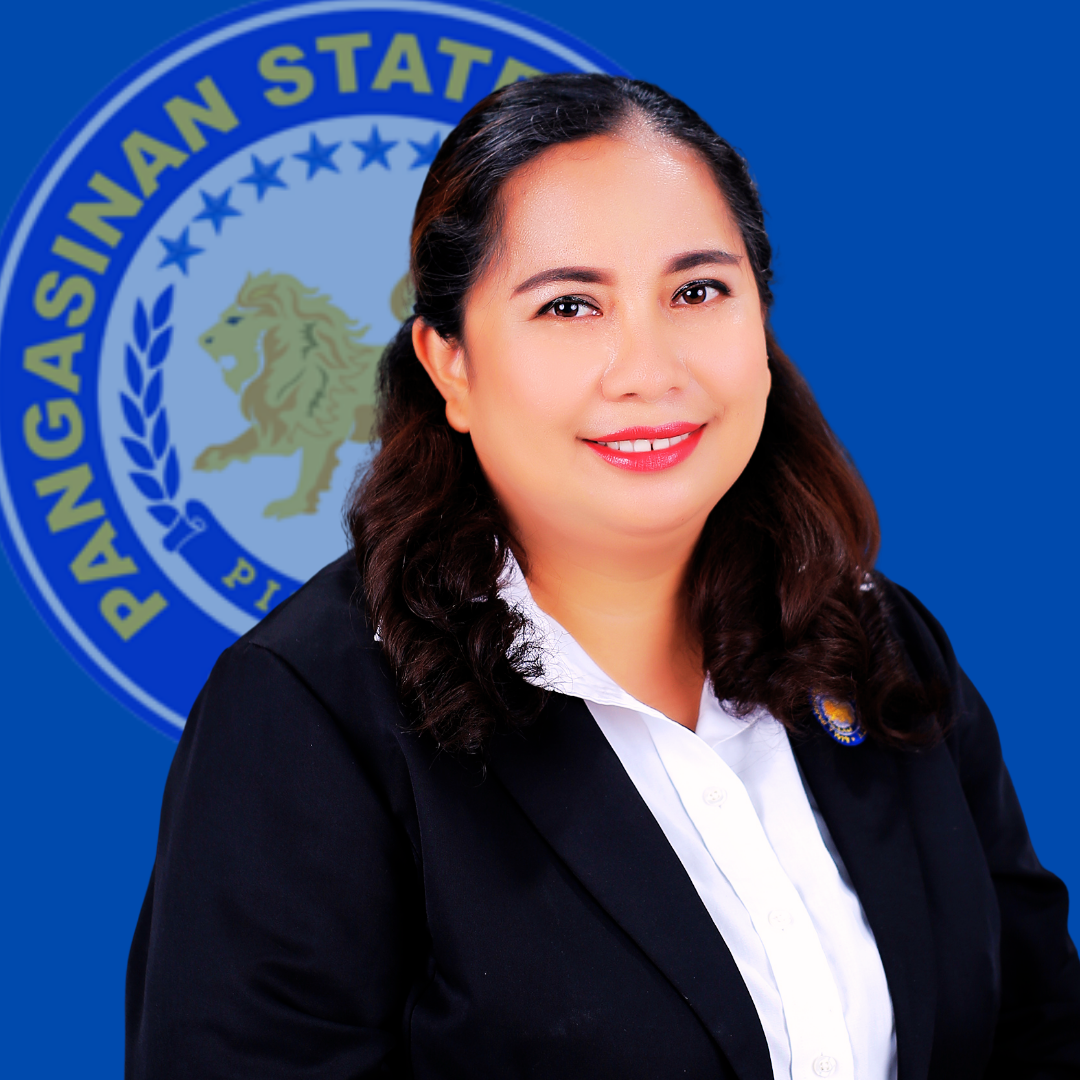
DR. CHENEE MARIE C. CACHO
Department Chair
WELCOME TO THE SPED DEPARTMENT!
The Secondary and Professional Education (SPED) Department is committed to provide quality education as manifested in the results of the licensure examination for the past years, accreditation status, and employability rate of our students. The SPED Department caters to the Bachelor of Secondary Education students from the three major fields, i.e., English, Filipino, and Mathematics.
Faculty members in the department are supportive of the University’s goal of providing quality education. Thus, we upgrade our facilities, subject the program to accreditation in the national and international levels, send faculty to various training inside and outside the country, and most importantly expose our students to real-life learning environment that will help enhance their leadership skills, competence, and teamwork.
Further, we shall continuously develop our curriculum to meet the workforce demands of the academe and strengthen ties with other agencies in the local and international level to ensure that our students have diverse learning experiences.
PSU ACC College of Teacher Education faculty screens reading materials for future references
The Library Services Office, headed by Ms. Luisa Andrea C. Junio (Campus Librarian) and Ms. Mary Ann Jacinta Soriano (Campus Assistant Librarian), organized a book drive in cooperation with the Great Books Trading. Books in general education, tourism management, and operations management were displayed for the faculty members to assess for the University’s acquisition.
The Environmental responsiveness of PSU ACC resides in the hearts of PSUians by selling recycled plastic bottles.
Haligi, a one-act play written and directed by Dr. Jenylyn V. Oboza won as the Best Stage Play during the First Hundred Islands Theater Festival hosted by the City Government of Alaminos. Lea Joy Fernando, a BSE English student, won as the best actress and best in costume.
Miss GAD Advocate
Miss Baby Angelie Reyes of 3rd year BSED English represents PSU-ACC during the Women’s Month Celebration held at PSU Lingayen Campus.
ACCREDITED
AACCUP LEVEL II
STUDENT’S EMPLOYMENT OPPORTUNITIES
After successful completion of all academic requirements of the degree/program, graduates of BEEd may practice teaching profession either in the elementary or college level.
Bachelor of Secondary Education (BSEd) major in Filipino
The BSEd degree program aims to develop highly motivated and competent teachers specializing in the content and pedagogy for secondary education.
Bachelor of Secondary Education (BSEd) major in Mathematics
The BSED degree program aims to develop highly motivated and competent teachers specializing in the content and pedagogy for secondary education.
Bachelor of Secondary Education (BSEd) major in English
The BSED English degree program aims to develop highly motivated and competent teachers specializing in the content and pedagogy in English for secondary education.
Bachelor of Secondary Education (BSEd) major in Filipino
| Program Outcomes | Performance Indicator |
|
Demonstrate through institutional mechanisms, system, policies, and processes which are reflective of transparency, equity, participatory decision making, and accountability. Effectively communicate orally and in writing using both Mother Tongue and English and Filipino Demonstrate mastery of subject matter/discipline. Nagpapamalas ng mataas na antas ng kaalaman sa pagtuturo ng wika at panitikang Filipino |
Naipaliliwanag ang mga batayang kaalaman sa pagtuturo ng Filipino |
|
Demonstrate through institutional mechanisms, system, policies, and processes which are reflective of transparency, equity, participatory decision making, and accountability. Effectively communicate orally and in writing using both Mother Tongue and English and Filipino Articulate the rootedness of education in philosophical, socio-cultural, historical, psychological, and political contexts. Demonstrate mastery of subject matter/discipline. Nagpapamalas ng mataas na antas ng kaalaman sa pagtuturo ng wika at panitikang Filipino |
Nailalapat ang kaalaman sa Filipino na nakasalig sa iba’t ibang teorya, pananaw, at prinsipyo sa pagkatuto at pagtuturo |
|
Act in recognition of professional, social, and ethical responsibility. Nagpapakita ng malawak at malalim na pag-unawa at kaalaman sa ugnayan ng wika, kultura at lipunan |
Naipaliliwanag ang papel ng wika bilang isang panlipunang penomenon |
|
Act in recognition of professional, social, and ethical responsibility. Practice professional and ethical teaching standards sensitive to the changing local, national, and global realities. Nagpapakita ng malawak at malalim na pag-unawa at kaalaman sa ugnayan ng wika, kultura at lipunan |
Nasusuri ang ugnayan ng wika, panitikan, kultura, at lipunan |
|
Display, socially and environmentally responsive organizational culture, which ensures higher productivity among the university constituents and elevate the welfare of the multi-sectoral communities. Act in recognition of professional, social, and ethical responsibility. Nagpapakita ng malawak at malalim na pag-unawa at kaalaman sa ugnayan ng wika, kultura at lipunan (PO 21) |
Nasusuri ang gamit ng wika sa iba’t ibang institusyong panlipunan |
|
Practice professional and ethical teaching standards sensitive to the changing local, national, and global realities. Nagpapakita ng malawak at malalim na pag-unawa at kaalaman sa ugnayan ng wika, kultura at lipunan |
Nakagagawa ng kritikal na pag-aaral hinggil sa mga napapanahong isyu sa wika, kultura, at lipunan at ang implikasyon nito sa pagtuturo at pagkatuto ng Filipino |
|
Articulate and discuss the latest development in the specific field of practice. Develop innovative curricula, instructional plans, teaching approaches, and resources for diverse learners. Nakakagamit ng iba’t ibang kasanayan at kaalaman sa proseso ng pagtuturo-pagkatuto |
Nakapagdidisenyo ng makabuluhang kurikulum batay sa pagtuturo at pagkatuto ng Filipino |
|
Engage in relevant, comprehensive, and sustainable development initiatives through multiple perspectives in decisions and actions that build personal and professional credibility and integrity. Develop innovative curricula, instructional plans, teaching approaches, and resources for diverse learners. Demonstrate a variety of thinking skills in planning, monitoring, assessing, and reporting learning processes and outcomes. Nakakagamit ng iba’t ibang kasanayan at kaalaman sa proseso ng pagtuturo-pagkatuto |
Nakabubuo ng plano ng pagkatuto ayon sa kahingian ng kurikulum |
|
Set challenging goals and tasks with determination and sense of urgency which provide continuous improvement and producing quality outputs leading to inclusive growth. Preserve and promote “Filipino historical and cultural heritage” Develop innovative curricula, instructional plans, teaching approaches, and resources for diverse learners. Nakakagamit ng iba’t ibang kasanayan at kaalaman sa proseso ng pagtuturo-pagkatuto |
Nakalilikha ng mga kagamitang pampagtuturo na nakaugat sa lokal na kultura |
|
Articulate and discuss the latest development in the specific field of practice. Apply skills in the development and utilization of ICT to promote quality, relevant, and sustainable educational practices. Nakakagamit ng iba’t ibang kasanayan at kaalaman sa proseso ng pagtuturo-pagkatuto |
Nakagagamit ng mga makabagong pagdulog, pagtasa, at pagtaya sa pagtuturo at pagkatuto ng Filipino |
|
Exhibit life-long learning and global competence proficiency in communication skills, intra/interpersonal skills, entrepreneurial skills, innovative mindset, research and production initiatives and capability in meeting industry requirements of local, ASEAN and international human capital market through relevant and comprehensive programs. Develop innovative curricula, instructional plans, teaching approaches, and resources for diverse learners. Apply skills in the development and utilization of ICT to promote quality, relevant, and sustainable educational practices. Practice professional and ethical teaching standards sensitive to the changing local, national, and global realities. Nakakagamit ng iba’t ibang kasanayan at kaalaman sa proseso ng pagtuturo-pagkatuto
|
Nakagagamit ng iba’t ibang lapit o dulog sa pagtuturo ng Filipino para sa ika-21 siglo |
|
Preserve and promote “Filipino historical and cultural heritage” Nagtataglay ng kaalaman hinggil sa usapin ng kultural at lingguwistikong dibersidad ng bansa |
Natutukoy at nasusuri ang mga barayti at baryasyon ng wikang Filipino |
|
Effectively communicate orally and in writing using both Mother Tongue and English and Filipino Work effectively and independently in multi-disciplinary and multi-cultural teams Preserve and promote “Filipino historical and cultural heritage” Nagtataglay ng kaalaman hinggil sa usapin ng kultural at lingguwistikong dibersidad ng bansa |
Napaghahambing ang mga pagkakatulad at pagkakaiba ng mga wika at kultura |
|
Display, socially and environmentally responsive organizational culture, which ensures higher productivity among the university constituents and elevate the welfare of the multi-sectoral communities. Practice spiritual values and morally upright behavior which promote and inspire greater harmony to project a credible public image. Effectively communicate orally and in writing using both Mother Tongue and English and Filipino Work effectively and independently in multi-disciplinary and multi-cultural teams Nagtataglay ng kaalaman hinggil sa usapin ng kultural at lingguwistikong dibersidad ng bansa |
Nakapagpapahayag ng mga saloobin sa kahalagahan ng pagkakatulad at pagkakaiba ng mga rehiyonal na panitikan |
|
Facilitate learning using a wide range of teaching methodologies and delivery modes appropriate to specific learners and their environments. Nakapagdidisenyo ng malikhain, inobatibo, at integratibong mga alternatibong dulog sa pagtuturo at pagkatuto. |
Nakagagamit ng iba’t ibang dulog sa pagtuturo at pagkatuto ng wika at panitikang Filipino |
|
Demonstrate a variety of thinking skills in planning, monitoring, assessing, and reporting learning processes and outcomes. Nakapagdidisenyo ng malikhain, inobatibo, at integratibong mga alternatibong dulog sa pagtuturo at pagkatuto |
Natataya ang bisa ng dulog sa epektibong pagtuturo-pagkatuto ng wika at panitikang Filipino |
|
Preserve and promote “Filipino historical and cultural heritage” Pursue lifelong learning for personal and professional growth through varied experiential and field-based opportunities. Nakakagagawa ng pananaliksik ukol sa ikauunlad ng wikang Filipino bilang wikang panturo Contribute to the generation of new knowledge by participating in various research and development projects. |
Nakagagawa ng pananaliksik ukol sa wika at panitikang Filipino |
|
Exhibit life-long learning and global competence proficiency in communication skills, intra/interpersonal skills, entrepreneurial skills, innovative mindset, research and production initiatives and capability in meeting industry requirements of local, ASEAN and international human capital market through relevant and comprehensive programs. Nakakagagawa ng pananaliksik ukol sa ikauunlad ng wikang Filipino bilang wikang panturo |
Nagtataglay ng kaalaman sa teknikal na aspeto ng pananaliksik sa pagtuturo at pagkatuto ng wika at panitikang Filipino |
|
Engage in relevant, comprehensive, and sustainable development initiatives through multiple perspectives in decisions and actions that build personal and professional credibility and integrity. Pursue lifelong learning for personal and professional growth through varied experiential and field-based opportunities. Nakakagagawa ng pananaliksik ukol sa ikauunlad ng wikang Filipino bilang wikang panturo |
Nakabubuo ng mga pag-aaral ukol sa pagtuturo at pagkatuto ng wikang Filipino
|
Bachelor of Secondary Education (BSEd) major in Mathematics
| Program Outcomes | Performance Indicator |
|
Exhibit competence in mathematical concepts and procedures. Demonstrate mastery of subject matter/discipline. Articulate and discuss the latest development in the specific field of practice. |
Explain and illustrate clearly, accurately, and comprehensively the basic mathematical concepts using relevant examples as needed. |
|
Exhibit competence in mathematical concepts and procedures. Demonstrate mastery of subject matter/discipline. Articulate and discuss the latest development in the specific field of practice. |
Demonstrate in detail basic mathematical procedures |
|
Exhibit competence in mathematical concepts and procedures. Demonstrate mastery of subject matter/discipline. Articulate and discuss the latest development in the specific field of practice. |
Show the connections between mathematical concepts that are related to one another |
|
Exhibit competence in mathematical concepts and procedures. Demonstrate mastery of subject matter/discipline. Articulate and discuss the latest development in the specific field of practice. |
Provide examples to illustrate the application of mathematical concepts and procedures. |
|
Exhibit proficiency in relating mathematics to other curricular areas. Preserve and promote “Filipino historical and cultural heritage” Develop innovative curricula, instructional plans, teaching approaches, and resources for diverse learners. Demonstrate a variety of thinking skills in planning, monitoring, assessing, and reporting learning processes and outcomes. |
Create a curriculum guide that shows how mathematics can be integrated with other curricular areas. |
|
Exhibit proficiency in relating mathematics to other curricular areas. Develop innovative curricula, instructional plans, teaching approaches, and resources for diverse learners. Demonstrate a variety of thinking skills in planning, monitoring, assessing, and reporting learning processes and outcomes. |
Identify teaching activities which support the implementation of the curriculum guide. |
|
Exhibit proficiency in relating mathematics to other curricular areas. Develop innovative curricula, instructional plans, teaching approaches, and resources for diverse learners. Demonstrate a variety of thinking skills in planning, monitoring, assessing, and reporting learning processes and outcomes. |
Develop and utilize instructional materials that support the integration of mathematics with other curricular areas.
|
|
Exhibit proficiency in relating mathematics to other curricular areas. Develop innovative curricula, instructional plans, teaching approaches, and resources for diverse learners. Apply skills in the development and utilization of ICT to promote quality, relevant, and sustainable educational practices. Demonstrate a variety of thinking skills in planning, monitoring, assessing, and reporting learning processes and outcomes. |
Utilize appropriate technologies to achieve learning outcomes. |
|
Manifest meaningful and comprehensive pedagogical content knowledge (PCK) of mathematics Demonstrate a variety of thinking skills in planning, monitoring, assessing, and reporting learning processes and outcomes. Pursue lifelong learning for personal and professional growth through varied experiential and field-based opportunities. Engage in relevant, comprehensive, and sustainable development initiatives through multiple perspectives in decisions and actions that build personal and professional credibility and integrity. Set challenging goals and tasks with determination and sense of urgency which provide continuous improvement and producing quality outputs leading to inclusive growth. Exhibit life-long learning and global competence proficiency in communication skills, intra/interpersonal skills, entrepreneurial skills, innovative mindset, research and production initiatives and capability in meeting industry requirements of local, ASEAN and international human capital market through relevant and comprehensive programs. Articulate and discuss the latest development in the specific field of practice. Work effectively and independently in multi-disciplinary and multi-cultural teams Contribute to the generation of new knowledge by participating in various research and development projects. |
Demonstrate skills in various methods of learning in mathematics such as, conducting investigations, modeling, and doing research.
|
|
Manifest meaningful and comprehensive pedagogical content knowledge (PCK) of mathematics. Demonstrate a variety of thinking skills in planning, monitoring, assessing, and reporting learning processes and outcomes. Engage in relevant, comprehensive, and sustainable development initiatives through multiple perspectives in decisions and actions that build personal and professional credibility and integrity. Set challenging goals and tasks with determination and sense of urgency which provide continuous improvement and producing quality outputs leading to inclusive growth. Exhibit life-long learning and global competence proficiency in communication skills, intra/interpersonal skills, entrepreneurial skills, innovative mindset, research and production initiatives and capability in meeting industry requirements of local, ASEAN and international human capital market through relevant and comprehensive programs. Articulate and discuss the latest development in the specific field of practice. Work effectively and independently in multi-disciplinary and multi-cultural teams |
Create and utilize learning experiences in the classroom which develop the learners’ skills in discovery learning, problem-solving, and critical thinking.
|
|
Demonstrate competence in designing, constructing, and utilizing different forms of assessment in mathematics. Demonstrate a variety of thinking skills in planning, monitoring, assessing, and reporting learning processes and outcomes. |
Design and utilize varied assessment tools in mathematics, including alternative forms of assessment. |
|
Demonstrate competence in designing, constructing, and utilizing different forms of assessment in mathematics. Demonstrate a variety of thinking skills in planning, monitoring, assessing, and reporting learning processes and outcomes. |
Analyze assessment results and use these to improve learning and teaching.
|
|
Demonstrate competence in designing, constructing, and utilizing different forms of assessment in mathematics. Demonstrate a variety of thinking skills in planning, monitoring, assessing, and reporting learning processes and outcomes. |
Provide timely feedback of assessment results to students |
|
Demonstrate proficiency in problem-solving by solving and creating routine and non-routine problems with different levels of complexity. Demonstrate mastery of subject matter/discipline. Facilitate learning using a wide range of teaching methodologies and delivery modes appropriate to specific learners and their environments. |
Demonstrate skills in various problem solving heuristics
|
|
Demonstrate proficiency in problem-solving by solving and creating routine and non-routine problems with different levels of complexity. Demonstrate mastery of subject matter/discipline. Facilitate learning using a wide range of teaching methodologies and delivery modes appropriate to specific learners and their environments. |
Select suitable examples to explain the various problem solving heuristics
|
|
Demonstrate proficiency in problem-solving by solving and creating routine and non-routine problems with different levels of complexity. Demonstrate mastery of subject matter/discipline. Facilitate learning using a wide range of teaching methodologies and delivery modes appropriate to specific learners and their environments. |
Manifest creativity and critical thinking when selecting examples and problems to be used in the classroom and in the assessment of students’ learning.
|
|
Demonstrate proficiency in problem-solving by solving and creating routine and non-routine problems with different levels of complexity. Demonstrate mastery of subject matter/discipline. Facilitate learning using a wide range of teaching methodologies and delivery modes appropriate to specific learners and their environments. |
Use varied resources for selecting and creating problems to develop the students’ problem solving skills. |
|
Use effectively appropriate approaches, methods, and techniques in teaching mathematics. Engage in relevant, comprehensive, and sustainable development initiatives through multiple perspectives in decisions and actions that build personal and professional credibility and integrity. Set challenging goals and tasks with determination and sense of urgency which provide continuous improvement and producing quality outputs leading to inclusive growth. Demonstrate a variety of thinking skills in planning, monitoring, assessing, and reporting learning processes and outcomes. Facilitate learning using a wide range of teaching methodologies and delivery modes appropriate to specific learners and their environments. |
Demonstrate knowledge and skills in varied approaches and methods of teaching mathematics.
|
|
Use effectively appropriate approaches, methods, and techniques in teaching mathematics. Engage in relevant, comprehensive, and sustainable development initiatives through multiple perspectives in decisions and actions that build personal and professional credibility and integrity. Set challenging goals and tasks with determination and sense of urgency which provide continuous improvement and producing quality outputs leading to inclusive growth. Facilitate learning using a wide range of teaching methodologies and delivery modes appropriate to specific learners and their environments. Demonstrate a variety of thinking skills in planning, monitoring, assessing, and reporting learning processes and outcomes. |
Manifest discretion when selecting approaches or methods that would be effective in teaching particular lessons.
|
|
Use effectively appropriate approaches, methods, and techniques in teaching mathematics. Engage in relevant, comprehensive, and sustainable development initiatives through multiple perspectives in decisions and actions that build personal and professional credibility and integrity. Set challenging goals and tasks with determination and sense of urgency which provide continuous improvement and producing quality outputs leading to inclusive growth. Demonstrate a variety of thinking skills in planning, monitoring, assessing, and reporting learning processes and outcomes. Facilitate learning using a wide range of teaching methodologies and delivery modes appropriate to specific learners and their environments. |
Utilizes a variety of student-centered approaches and methods in the classroom.
|
|
Use effectively appropriate approaches, methods, and techniques in teaching mathematics. Facilitate learning using a wide range of teaching methodologies and delivery modes appropriate to specific learners and their environments. Apply skills in the development and utilization of ICT to promote quality, relevant, and sustainable educational practices. Demonstrate a variety of thinking skills in planning, monitoring, assessing, and reporting learning processes and outcomes. |
Demonstrate skills in the use of common mathematical software for teaching and learning mathematical concepts e.g. Graphmatica, Geogebra, etc. |
|
Use effectively appropriate approaches, methods, and techniques in teaching mathematics. Facilitate learning using a wide range of teaching methodologies and delivery modes appropriate to specific learners and their environments. Apply skills in the development and utilization of ICT to promote quality, relevant, and sustainable educational practices. Demonstrate a variety of thinking skills in planning, monitoring, assessing, and reporting learning processes and outcomes. |
Develop and use materials that guide the students in using mathematical software for discovering and learning mathematical concepts. |
|
Appreciate mathematics as an opportunity for creative work, moments of discovery, and gaining insights of the world. Articulate the rootedness of education in philosophical, socio-cultural, historical, psychological, and political contexts. Display, socially and environmentally responsive organizational culture, which ensures higher productivity among the university constituents and elevate the welfare of the multi-sectoral communities. |
Model in class such mathematical attitudes as delight after having found the solution to a problem or a sense of wonder at how certain mathematical concepts evolved.
|
|
Appreciate mathematics as an opportunity for creative work, moments of discovery, and gaining insights of the world. Articulate the rootedness of education in philosophical, socio-cultural, historical, psychological, and political contexts. Display, socially and environmentally responsive organizational culture, which ensures higher productivity among the university constituents and elevate the welfare of the multi-sectoral communities. Demonstrate a variety of thinking skills in planning, monitoring, assessing, and reporting learning processes and outcomes. Act in recognition of professional, social, and ethical responsibility. |
Develop lessons that can help students appreciate the use of mathematics in daily life. |
|
Demonstrate through institutional mechanisms, system, policies, and processes which are reflective of transparency, equity, participatory decision making, and accountability. Practice spiritual values and morally upright behavior which promote and inspire greater harmony to project a credible public image. Effectively communicate orally and in writing using both Mother Tongue and English and Filipino Act in recognition of professional, social, and ethical responsibility. Practice professional and ethical teaching standards sensitive to the changing local, national, and global realities. |
Work in a way that creates openness and communicate information without reservations.
|
|
Demonstrate through institutional mechanisms, system, policies, and processes which are reflective of transparency, equity, participatory decision making, and accountability. Practice spiritual values and morally upright behavior which promote and inspire greater harmony to project a credible public image. Effectively communicate orally and in writing using both Mother Tongue and English and Filipino Act in recognition of professional, social, and ethical responsibility. Practice professional and ethical teaching standards sensitive to the changing local, national, and global realities. |
Treats students fairly regardless of background.
|
|
Demonstrate through institutional mechanisms, system, policies, and processes which are reflective of transparency, equity, participatory decision making, and accountability. Practice spiritual values and morally upright behavior which promote and inspire greater harmony to project a credible public image. Effectively communicate orally and in writing using both Mother Tongue and English and Filipino Act in recognition of professional, social, and ethical responsibility. Practice professional and ethical teaching standards sensitive to the changing local, national, and global realities. |
Takes responsibility with his actions and decisions. |
|
Practice spiritual values and morally upright behavior which promote and inspire greater harmony to project a credible public image. Act in recognition of professional, social, and ethical responsibility. Practice professional and ethical teaching standards sensitive to the changing local, national, and global realities. |
Practice ethical standards for professional teachers.
|
|
Practice spiritual values and morally upright behavior which promote and inspire greater harmony to project a credible public image. Act in recognition of professional, social, and ethical responsibility. Practice professional and ethical teaching standards sensitive to the changing local, national, and global realities.
|
Actions are guided by moral and spiritual principles. |
Bachelor of Secondary Education (BSEd) major in English
| Program Outcomes | Performance Indicator |
|
Articulate the rootedness of education in philosophical, socio-cultural, historical, psychological, and political contexts Demonstrate mastery of subject matter/discipline Demonstrate a variety of thinking skills in planning, monitoring, assessing, and reporting learning processes and outcomes Demonstrate high level of content and pedagogical knowledge |
Integrate the relationship of language, literature, culture, and society in the teaching-learning process. |
|
Demonstrate mastery of subject matter/discipline Possess broad knowledge of language and literature for effective learning |
Conduct an independent investigation of a selected structure of English in the context of the language classroom. |
|
Effectively communicate orally and in writing using both Mother Tongue and English and Filipino Possess broad knowledge of language and literature for effective learning |
Critique selected literary pieces using appropriate literary theories. |
|
Articulate and discuss the latest development in the specific field of practice Effectively communicate orally and in writing using both Mother Tongue and English and Filipino. Demonstrate mastery of subject matter/ discipline Use English as a glocal language in multilingual context as it applies to the teaching of language and literature. |
Incorporate features of English as a glocal language in the design of the curriculum, learning activities, and materials. |
|
Demonstrate through institutional mechanisms, system, policies, and processes which are reflective of transparency, equity, participatory decision making, and accountability. Engage in relevant, comprehensive, and sustainable development initiatives through multiple perspectives in decisions and actions that build personal and professional credibility and integrity. Set challenging goals and tasks with determination and sense of urgency which provide continuous improvement and producing quality outputs leading to inclusive growth. Display, socially and environmentally responsive organizational culture, which ensures higher productivity among the university constituents and elevates the welfare of the multi-sectoral communities. Effectively communicate orally and in writing using both Mother Tongue and English and Filipino. Work effectively and independently in multi-disciplinary and multi-cultural teams Preserve and promote “Filipino historical and cultural heritage”. Use English as a glocal language in multilingual context as it applies to the teaching of language and literature. Inspire students and colleagues to lead relevant and transformative changes to improve learning and teaching language and literature. |
Draft a proposal for and implements a community-based English language or literature-based learning program. |
|
Develop innovative curricula, instructional plans, teaching approaches, and resources for diverse learners. Acquire extensive reading background in language, literature, and allied fields. |
Prepare an annotated reading list appropriate for a particular grade level to enhance students’ reading skills. |
|
Articulate and discuss the latest development in the specific field of practice. Develop innovative curricula, instructional plans, teaching approaches, and resources for diverse learners. Acquire extensive reading background in language, literature, and allied fields. |
Show the ability to enrich the curriculum to include an extensive reading list for learning language, literature, and allied fields. |
|
Effectively communicate orally and in writing using both Mother Tongue and English and Filipino. Demonstrate proficiency in oral and written communication. |
Utilize a variety of oral communication forms in order to become an effective model to learners. |
|
Effectively communicate orally and in writing using both Mother Tongue and English and Filipino. Demonstrate a variety of thinking skills in planning, monitoring, assessing, and reporting learning processes and outcomes. Demonstrate proficiency in oral and written communication. |
Prepare original compositions in expository and creative writing. |
|
Facilitate learning using a wide range of teaching methodologies and delivery modes appropriate to specific learners and their environments. Develop innovative curricula, instructional plans, teaching approaches, and resources for diverse learners. Practice professional and ethical teaching standards sensitive to the changing local, national, and global realities. Show competence in employing innovative language and literature teaching approaches, methodologies, and strategies. |
Employ a variety of teaching approaches, methodologies, and strategies.. |
|
Facilitate learning using a wide range of teaching methodologies and delivery modes appropriate to specific learners and their environments. Develop innovative curricula, instructional plans, teaching approaches, and resources for diverse learners. Show competence in employing innovative language and literature teaching approaches, methodologies, and strategies. |
Design learning plans following the expectations of the curricula for Grades 7-10. |
|
Effectively communicate orally and in writing using both Mother Tongue and English and Filipino. Act in recognition of professional, social, and ethical responsibility. Facilitate learning using a wide range of teaching methodologies and delivery modes appropriate to specific learners and their environments. Develop innovative curricula, instructional plans, teaching approaches, and resources for diverse learners. Show competence in employing innovative language and literature teaching approaches, methodologies, and strategies. |
Perform one independent and one supervised teaching demonstration. |
|
Effectively communicate orally and in writing using both Mother Tongue and English and Filipino. Develop innovative curricula, instructional plans, teaching approaches, and resources for diverse learners. Show competence in employing innovative language and literature teaching approaches, methodologies, and strategies. |
Construct appropriate assessment tools for the language and literature classroom. |
|
Apply skills in the development and utilization of ICT to promote quality, relevant, and sustainable educational practices. Use technology in facilitating language learning and teaching. |
Design computer-assisted language and literature learning tasks. |
|
Effectively communicate orally and in writing using both Mother Tongue and English and Filipino. Develop innovative curricula, instructional plans, teaching approaches, and resources for diverse learners. Apply skills in the development and utilization of ICT to promote quality, relevant, and sustainable educational practices. Use technology in facilitating language learning and teaching. |
Prepare one independent and one supervised technology-based lesson. |
|
Set challenging goals and tasks with determination and sense of urgency which provide continuous improvement and producing quality outputs leading to inclusive growth. Practice spiritual values and morally upright behavior which promote and inspire greater harmony to project a credible public image. Effectively communicate orally and in writing using both Mother Tongue and English and Filipino. Inspire students and colleagues to lead relevant and transformative changes to improve learning and teaching language and literature. Contribute to the generation of new knowledge by participating in various research and development projects. |
Conduct a community language profiling survey to make lessons more localized |
|
Set challenging goals and tasks with determination and sense of urgency which provide continuous improvement and producing quality outputs leading to inclusive growth. Display skills and abilities to be a reflective and research-oriented language and literature teacher Contribute to the generation of new knowledge by participating in various research and development projects. |
Conduct a comprehensive language profiling to identify students’ needs. |
|
Set challenging goals and tasks with determination and sense of urgency which provide continuous improvement and producing quality outputs leading to inclusive growth. Exhibit life-long learning and global competence proficiency in communication skills, intra/interpersonal skills, entrepreneurial skills, innovative mindset, research and production initiatives and capability in meeting industry requirements of local, ASEAN and international human capital market through relevant and comprehensive programs. Act in recognition of professional, social, and ethical responsibility. Display skills and abilities to be a reflective and research-oriented language and literature teacher. Contribute to the generation of new knowledge by participating in various research and development projects. |
Conduct an analysis of assessment results to improve teaching and learning in a language classroom. |
|
Set challenging goals and tasks with determination and sense of urgency which provide continuous improvement and producing quality outputs leading to inclusive growth. Exhibit life-long learning and global competence proficiency in communication skills, intra/interpersonal skills, entrepreneurial skills, innovative mindset, research and production initiatives and capability in meeting industry requirements of local, ASEAN and international human capital market through relevant and comprehensive programs. Act in recognition of professional, social, and ethical responsibility. Pursue lifelong learning for personal and professional growth through varied experiential and field-based opportunities. Display skills and abilities to be a reflective and research-oriented language and literature teacher. Contribute to the generation of new knowledge by participating in various research and development projects. |
Conduct research concerning the teaching of language and literature. |
FILIPINO:
- Nagpapamalas ng mataas na antas ng kaalaman sa pagtuturo ng wika at panitikang Filipino
- Nagpapakita ng malawak at malalim na pag-unawa at kaalaman sa ugnayan ng wika, kultura at lipunan
- Nakakagamit ng iba’t ibang kasanayan at kaalaman sa proseso ng pagtuturo-pagkatuto
- Nagtataglay ng kaalaman hinggil sa usapin ng kultural at lingguwistikong dibersidad ng bansa
- Nakapagdidisenyo ng malikhain, inobatibo, at integratibong mga alternatibong dulog sa pagtuturo at pagkatuto
- Nakagagawa ng pananaliksik ukol sa ikauunlad ng wikang Filipino bilang wikang panturo
MATH
- Exhibit competence in mathematical concepts and procedures.
- Exhibit proficiency in relating mathematics to other curricular areas.
- Manifest meaningful and comprehensive pedagogical content knowledge (PCK) of mathematics
- Demonstrate competence in designing, constructing and utilizing different forms of assessment in mathematics.
- Demonstrate proficiency in problem solving by solving and creating routine and non-routine problems with different levels of complexity
- Use effectively appropriate approaches, methods, and techniques in teaching mathematics including technological tools
- Appreciate mathematics as an opportunity for creative work, moments of enlightenment, discovery and gaining insights of the world.
ENGLISH
- Possess broad knowledge of language and literature for effective learning.
- Use English as a glocal language in multilingual context as it applies to the teaching of language and literature.
- Acquire extensive reading background in language, literature, and allied fields.
- Demonstrate proficiency in oral and written communication.
- Show competence in employing innovative language and literature teaching approaches, methodologies, and strategies.
- Use technology in facilitating language learning and teaching.
- Inspire students and colleagues to lead relevant and transformative changes to improve learning and teaching language and literature.
- Display skills and abilities to be a reflective and research-oriented language and literature teacher.

